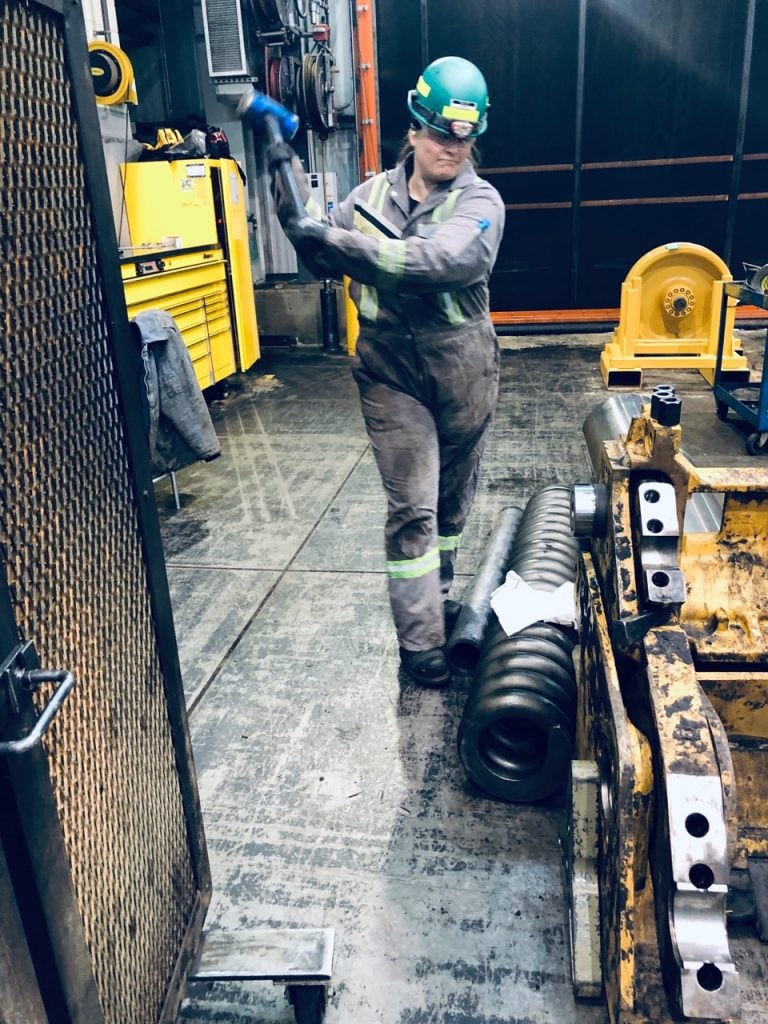Day in the Life: Beckey – Heavy Equipment Technician Apprentice
- 4 min read
The day Beckey turned 39 in 2019, she became an unabashed mechanic apprentice working on “yellow iron.” Translation: she started working as a heavy equipment technician for Finning Canada, which manufactures yellow-coloured Caterpillar heavy equipment. Examples include giant D11 dozers, the world’s largest haul trucks and ginormous excavators that are used in and around Fort McMurray, the heart of Canada’s oil sands mining operations.
A generation ago, Beckey might have been called a mechanic. Except a generation ago, women were seldom ever heavy equipment mechanics. Beckey is just one of four women working on equipment at her branch.
Working on heavy equipment is not for the faint of heart or weak of back—whatever their gender.
“I like how I feel at the end of every shift. I don’t feel like I’ve worked all day,” Beckey says with a smile in her voice. “I’m really happy . . . I’d like to work on wrenches for as long as possible.”

A Typical Day
“I start my day at 6:30 a.m.,” Beckey says. “We have a quick meeting in the morning where we discuss any issues we may be having, then we do some stretches.”
“Once that is done, I complete a job hazard identification form outlining any hazards I may run into and how to mitigate them. Then I get to work doing anything my supervisor or journeyman ask me to do.”
One day Beckey could be tearing down a dozer for a regular servicing. The next day she could be reconditioning truck frames, washing a unit bigger than a double garage or fine tuning a machine before it goes back into the field.
“I really enjoy this aspect; no day is ever the same. I’ll do something one day and it will be a few weeks before I do it again.”
Because she’s new to the trade, Beckey is always learning.
“I used to be in procurement and I’d reached the top of what I could do. Now, I’m learning something new every day. I can honestly say I like what I do.”
She also likes the rotations, working 14 days straight and then having 14 days off. Plus, the workplace vibe and culture agrees with her.
“There’s no drama, no worries about what my hair looks like or what kind of shoes I’m wearing. I’ve always liked working with ‘the guys.’ I have a lot in common with them because I like hunting, camping and fishing.” And in the summers, she also rides the open highways on her Harley Davidson with her dog as her passenger.
“I used to be in procurement and I’d reached the top of what I could do. Now, I’m learning something new every day. I can honestly say I like what I do.”
Beckey, Heavy Equipment Technician Apprentice
Thinking and Working Hard
Working on heavy equipment is more than leaning over an engine. The size of some oil sands equipment can mean climbing deep into them.
“I get into some tight spaces,” Beckey says. “I like how I feel when I’ve accomplished something. I can physically see I’ve fixed something.”
Her most used skill in repairing equipment is problem-solving.
“Mechanics is basically like tearing apart something, then putting the puzzle back together with a scattered roadblock thrown in. It’s challenging and I love it.”

A Third Career
Beckey’s first career began in 1999 when she became an emergency medical responder in the oil and gas industry. After eight years, she moved to Fort McMurray to work in supply chain management, earning a professional designation in 2014. But she wanted more and felt the tug of working on heavy equipment — and the opportunities it offers.
“I’m in the oil patch now, but not only the oil patch uses heavy equipment. So many industries have heavy equipment and I could go anywhere in the world — offshore, Asia, Russia or Great Britain.”
For mechanics, working on heavy equipment used to be a matter of understanding “levers and cables,” Beckey says. Today, heavy equipment technicians have a highly specialized knowledge of hydraulics, electronics as well as mechanics.
Breaking into the trade is never easy and it’s getting harder.
“It used to be you might be able to start in a shop as a labourer,” Beckey says. But those jobs have largely disappeared.
“You have to show you have a real interest. The hardest part of the job is finding someone willing to help you break in. Beckey’s hoping to get into Finning’s Think Big program, which sponsors apprentices.
If successful, she’ll have four years of apprenticeship studies. Beckey’s up for the challenge.
“I have zero regrets choosing this path. I would urge anyone who is thinking about a career transition, no matter how different it is, to go for it. Life is too short to be stuck doing something your heart isn’t into anymore.”
Beckey, Heavy Equipment Technician Apprentice
Company
Location
Edmonton, Alberta
Salary
$48,000 to $87,000
Education
4 year journeyman mechanic program, apprentice
Salary, education and advancement may vary from company to company.
